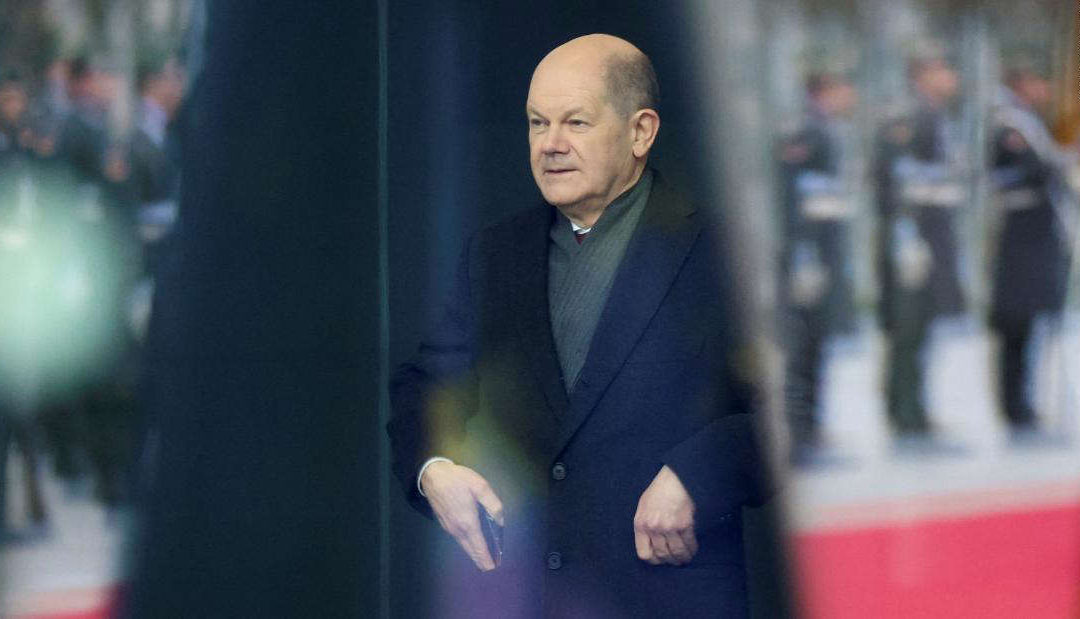在俄罗斯的导弹雨点般地落在乌克兰之后的一周里,德国改变了其数十年来轻装军事的外交政策,预示着现代欧洲的面貌发生了戏剧性的转变。德国总理奥拉夫·肖尔茨(Olaf Scholz)周日在联邦议院(Bundestag)的一次特别会议上表示,“普京的战争”对德国和欧洲来说代表了一个“时代的转变”(Zeitenwende)。肖尔茨说,在这个“许多人仍然记得父母或祖父母的战争故事”的国家,来自乌克兰各地城市的“可怕画面”“深深地影响了我们所有人”。与此同时,数以万计的德国人周末聚集在勃兰登堡门附近,谴责克里姆林宫的侵略行为,这是全球各地众多此类抗议活动之一。因此,在德国政府对俄罗斯侵略反应怯懦的普遍批评持续数周后,肖尔茨宣布了一项对德国外交、安全和国防政策进行全面改革的计划;为乌克兰提供武器,并在未来几年向乌克兰军队注入数十亿美元。
迟做总比不做好。德国是欧盟最大的经济体,也可以说是最强大的成员国。直到最近,在俄罗斯沿着乌克兰边境逐渐集结军队的问题上,德国一直落后于其欧洲盟友一步,在北溪2号(Nord Stream 2)、SWIFT和向乌克兰输送武器的问题上一直拖后腿。当俄罗斯2014年首次派兵进入乌克兰吞并克里米亚并占领顿巴斯地区的部分地区时,一些政策制定者已经看到了后冷战时代的结束。尽管如此,德国政府还是在2015年批准了来自俄罗斯的北溪2号天然气管道的建设。前总理安格拉•默克尔(Angela Merkel)领导的基督教民主党(Christian Democratic party)和肖尔茨(Scholz)领导的社会民主党(Social Democrats)的领导人都为该计划进行了辩护,反对多年来国内外越来越多的批评。
上周,德国对俄罗斯的说法开始转变。在俄罗斯正式承认乌克兰东部被占领地区独立后,肖尔茨宣布停止管道的认证程序,并对德国的能源安全指导方针进行审查。然后在周六,在德国的更多欧洲伙伴开始向乌克兰运送武器和其他军事物资之后,肖尔茨宣布,德国现在也将向乌克兰运送1000件反坦克武器和500件防空武器。第二天,肖尔茨宣布,从现在开始,德国每年将把GDP的2%以上用于武装力量。他还承诺设立1000亿欧元(1100亿美元)的特别基金,用于在数十年的预算削减后,对联邦国防军的准备工作和现代化进行战略投资。1990年,德国人认为他们终于可以永远放弃地缘政治。在20世纪上半叶,他们对权力和领土的渴望两次蹂躏了欧洲,造成数百万人死亡,特别是纳粹德国在东欧的毁灭战争。在冷战期间,如果东西方对峙变得激烈,德国就会变成月球表面。
因此,在1990年,德国人觉得他们终于站在了历史正确的一边。他们希望其他所有人都跟随他们走向开明合作的道路。人们对俄罗斯的加入寄予了很高的希望——“通过贸易实现变革”和“转型伙伴关系”正在引导德国对俄罗斯的政策。一种历史罪恶感也是一个强大的推动力,就像德国对廉价化石燃料的渴求一样。
普京上周对乌克兰的攻击打破了这一泡沫。正如德国外长贝尔伯克在周日的议会特别会议上所说:“如果我们的世界是一个不同的世界,那么我们的政策也必须不同。”德国经济与气候部长罗伯特•哈贝克(Robert Habeck)补充称,二战的结果是,德国将减少其在俄罗斯和其他威权国家的经济胁迫下的脆弱性。通过加速德国的“能源转型”(Energiewende)——到2035年向100%可再生能源过渡——来加强能源安全将是这项努力的关键部分。哈贝克“没有任何禁忌”的表态,很可能暗示德国也在考虑延长现有的三座核电站的使用寿命,以弥补俄罗斯短期内的天然气供应中断。德国对其国防能力的重新投资也可能为欧盟和北约内部的欧洲支柱开启巨大的潜力。较小的国家,特别是中欧和东欧的国家,可以依靠德国提供战略支持,例如军事空运和侦察能力。他们还可以依靠德国的战备状态来加强盟军的威慑,而不仅仅是在多边的“绊网”部队的存在上,就像目前部署在北约东侧的“加强前沿阵地”。
这些有限的部署旨在通过让所有盟国做出强有力的回应来遏制俄罗斯的攻击。然而,就其本身而言,它们不足以抵御像在乌克兰那样的大规模入侵。北约在未来几个月的额外部署将不是为了威慑,而是为了击败俄罗斯的侵略。部署规模将更大,能力也将更强。尽管随着普京对乌克兰的攻击,德国与俄罗斯长期以来的特殊关系不复存在,但如果出现冲突,与克里姆林宫的外交渠道仍对推动俄罗斯走上缓和局势的道路至关重要。事实上,肖尔茨在周日的讲话中还承诺继续争取“尽可能多的外交手段,而不是天真。”
但乌克兰战争、普京对白俄罗斯的实际吞并、松散的核言论,以及重建俄罗斯帝国势力的愿望,从根本上重新绘制了欧洲的安全版图。肖尔茨和大多数德国人似乎都认识到了时代的变化。为其后果做准备需要各级的持续领导。但是,为了自己的利益,为了德国和欧洲,肖尔茨必须成功,因为他将自己的政治命运与这次改革联系在一起。
(以上为中文简译,以下为英文报道的原文)
In the week since Russian missiles began raining down on Ukraine, Germany has upturned its decadeslong military-light foreign policy, heralding a dramatic shift in the complexion of modern Europe.
“Putin’s war” represented nothing less than a “Zeitenwende” — a change of times — for Germany and Europe, German chancellor Olaf Scholz told a special session of the Bundestag Sunday.
In a country where “many of us still remember our parents’ or grandparents’ tales of war,” Scholz said the “terrible images” coming out of cities across Ukraine “affect us all very deeply.”
At the same time, tens of thousands of Germans gathered near the Brandenburg Gate at the weekend to condemn the Kremlin’s act of aggression, one of many such protests across the globe.
And so, after weeks of widespread criticism of his government’s timid response to Russian aggression, Scholz announced what amounted to a complete overhaul of Germany’s foreign, security and defense policy; supplying weapons to Ukraine and pumping billions of dollars into its own armed forces in the coming years.
Better late than never. Germany, which is the European Union’s biggest economy and arguably most powerful member state, had until recently been a step behind its European allies on Russia’s gradual buildup of troops along the border of Ukraine, dragging its heels on Nord Stream 2, SWIFT and arms transfers to Ukraine.
Some policymakers had already seen the end of the post-Cold War era arrive when Russia first sent troops into Ukraine in 2014 to annex Crimea and occupy parts of the Donbas region.
Still, the German government went ahead and greenlit the construction of the Nord Stream 2 gas pipeline from Russia in 2015. And leaders from both former chancellor Angela Merkel’s Christian Democratic party and Scholz’s Social Democrats defended the project against mounting domestic and international criticism over the years.
Last week, Germany’s narrative on Russia started to shift. After Russia formally recognized the occupied regions in eastern Ukraine as independent, Scholz announced a halt to the pipeline’s certification process and a review of Germany’s energy security guidelines.
Then Saturday, after more of Germany’s European partners began transferring weapons and other military supplies to Ukraine, Scholz announced Germany now, too, would send 1,000 anti-tank and 500 anti-aircraft weapons. The following day, Scholz announced Germany would spend upwards of 2% of its GDP annually on its armed forces from now on. He also promised the creation of a €100-billion ($110 billion) special fund for strategic investments in the Bundeswehr’s readiness and modernization after decades of budget cuts.
In 1990, Germans thought they could finally abandon geopolitics for good. During the first half of the 20th century, their hunger for power and territory had ravaged Europe twice, leaving millions upon millions dead, especially as the result of Nazi Germany’s war of annihilation in Eastern Europe. During the Cold War, Germany would have been turned into a moonscape, had the East-West confrontation ever turned hot.
So in 1990, Germans felt as though they finally stood on the right side of history. And they expected everyone else to follow suit on their path toward enlightened cooperation. Hopes were particularly high Russia could be brought into the fold — “change through trade” and “transformation partnership” were guiding German policies toward Russia.
A sense of historical guilt was a powerful driving force, too, as was Germany’s thirst for cheap fossil fuels to power its industry.
Putin’s attack on Ukraine last week burst that bubble.
As German Foreign Minister Annalena Baerbock said during Sunday’s special session of parliament: “If our world is a different one, then our policy must also be different.” Robert Habeck, Germany’s minister of the economy and climate, added as a result of the war, Germany would reduce its vulnerability to economic coercion by Russia and other authoritarian powers.
Enhancing energy security by accelerating Germany’s “Energiewende” — the transition to 100% renewable energy generation by 2035 — will be a key part of the effort. Habeck’s comment to do so “without any taboos” is a likely hint to also consider extending the life span of Germany’s three remaining nuclear power plants to compensate for Russian gas cutoffs in the short term.
Germany’s renewed investment in its defense capabilities could also unlock enormous potential for the European Union and the European pillar within NATO.
Smaller countries, particularly those in Central and Eastern Europe, could lean on Germany for strategic enablers, such as military airlift and reconnaissance capabilities. They could also count on German combat readiness to boost allied deterrence beyond the mere presence of multilateral tripwire forces, as is currently the case with the Enhanced Forward Presence deployments on NATO’s eastern flank.
These limited deployments are supposed to deter a Russian attack by committing all allies to a forceful response. In themselves, though, they are insufficient to fend off a large-scale invasion like in Ukraine. Additional NATO deployments in the coming months would aim not at deterring but at defeating Russian aggression. The deployments would be larger and more capable.
While Germany’s long-standing special relationship with Russia ceased to exist with Putin’s attack on Ukraine, diplomatic channels with the Kremlin remain of critical importance to nudge Russia toward a path of de-escalation should one emerge. Indeed, in Sunday’s address, Scholz also promised to continue to strive for “as much diplomacy as possible, without being naive.”
But the war against Ukraine, Putin’s de facto absorption of Belarus, loose nuclear rhetoric, and desire to recreate Russia’s imperial reach have fundamentally redrawn the European security landscape.
Scholz, and with him most Germans, seem to have recognized the change of times. Preparing for its consequences will require sustained leadership at all levels. But having tied his personal political fortunes to this overhaul, Scholz must succeed, for his own sake, for Germany and Europe.
(Edited:Michael/Carol, Reviewed:Kejian S.)


